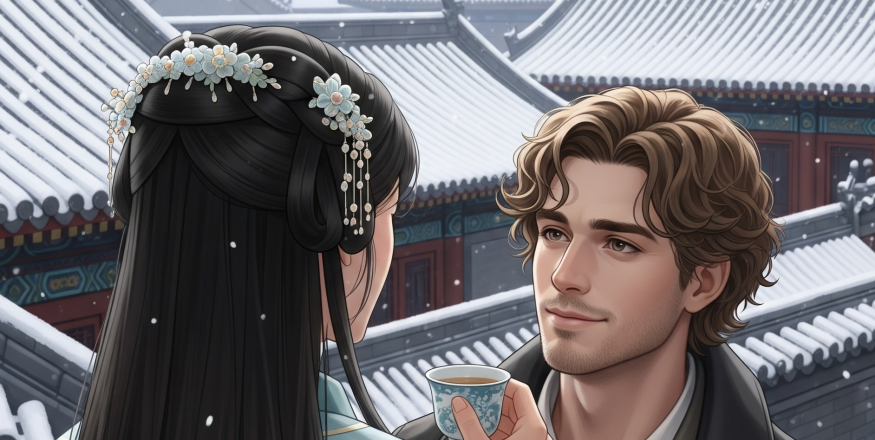This evocative story, set against the hushed backdrop of a Beijing winter, unfolds the tender and complex romance between Lin Yue, whose name means moonlight, and Daniel, an artist from Lisbon. Their love story, born in the National Library and nurtured over countless cups of tea, transcends the barriers of language, culture, and familial expectations, proving that love, in its purest form, is a language all its own.
It began in the hush of a Beijing winter, the kind of silence that hung in the air like unsaid words. Snowfall curled itself gently around ancient rooftops, and a city bruised by time shimmered in grayscale. Lin Yue met him—Daniel—on the 7th floor of the National Library, where the books slept like old gods and the heating was unreliable. He asked for help. In Mandarin. Stumblingly. With the hesitancy of someone trying not to break anything with their tongue.
She laughed—not cruelly, but like windchimes. Her name meant moonlight, and that was what she became to him—glancing, distant, illuminating.
He was from Lisbon, or at least that’s what he said, with a shrug. His vowels softened by the Atlantic, and eyes the color of almond bark after rain. An artist, or maybe just someone escaping something else. He said “你好” and “谢谢” with such reverence, she thought he might be praying.
They began with tea. Always tea. Dragon Well in the old part of town, served by a woman with hair like folded origami. They spoke in a hybrid of tongue and gesture: Mandarin, English, Portuguese, Google Translate, and long, wide silences. Sometimes they said nothing and just watched the leaves unfurl in their cups like small, aching secrets.
Her parents didn’t understand. Her mother’s silence stretched for days. Her father, a retired railway engineer with a spine like a train track, warned of foreign men who come and go like typhoons. “Not our kind,” he said, as if love had dialects. As if hearts came stamped with country codes.
Daniel’s mother called Yue “exotic” in a letter, like she was a fruit or a bird or a myth. His father never called at all. They thought he’d come back to Europe eventually, to marry someone with vowels like theirs, someone who’d understand what it meant to grow up beside the Tejo.
But Yue had the poetry of rain in her, and he, the hunger of someone who’d wandered deserts.
They fought. About tones. And dumpling etiquette. And whether love needed translation. She’d cry in Mandarin and he’d reply in English, and the words would slam against each other like tectonic plates, causing earthquakes in their kitchen. Once, he accused her of disappearing when things got hard. She said, “You don’t even know what hard means here.” The room fell into a rupture.
But later, he wrote her name a hundred times on rice paper, like a monk atoning. She came home to find them fluttering from the ceiling like ghost petals. Yue.
They kissed like people trying to survive. As if their mouths could erase the bureaucracy of difference. At night, she’d read him poetry. Han Yu. Xu Zhimo. He didn’t understand the words, but the rhythm curled around him like incense smoke. He’d sketch her as she spoke, tracing her profile with charcoal and want. “You sound like dusk,” he whispered once.
Spring cracked open the city. Magnolias like pale lanterns blinked into life. Her parents softened when he began learning characters with a child’s diligence, sticking flashcards on their refrigerator. “饭 – rice. 家 – home. 爱 – love.” He wrote them crookedly but earnestly, like letters to someone he hadn’t met yet.
When he took her hand at a Lunar New Year gathering, her grandfather, who had said little all year, nodded once. As if to say, So. The boy stays. It was enough.
They learned to live in the space between words. A bridge made not of language but of shared small things: the way she peeled lychees for him, the way he warmed her slippers in winter. They were not fluent in each other, but they were proficient in care.
On Sundays, they would walk the hutongs, past red doors and curled stone lions. She’d point at lanterns and whisper legends. He’d listen like a pilgrim. Once, outside a temple, he asked if she believed in forever. She didn’t answer. Just laced her fingers with his, and held on as if forever were something you could hold, briefly.
They didn’t become one. That’s not how it works. They became two people who chose, daily, hourly, breath by breath, to stay.
And when summer came, when the air was thick with jasmine and motorbike smoke, she whispered “我爱你” and he said, not “I love you,” but Yue. As if her name contained all the syllables of love he would ever need.
Even now, years later, when they speak to their daughter in two tongues, Yue sometimes catches him tracing her name on old receipts, menus, the fogged window of the train. Like it’s the only word he wants to remember.
Because in the end, love is not a language.
It’s a hush.
A teacup.
A name written 100 times in crooked, faithful ink.








 Login with Facebook
Login with Facebook
